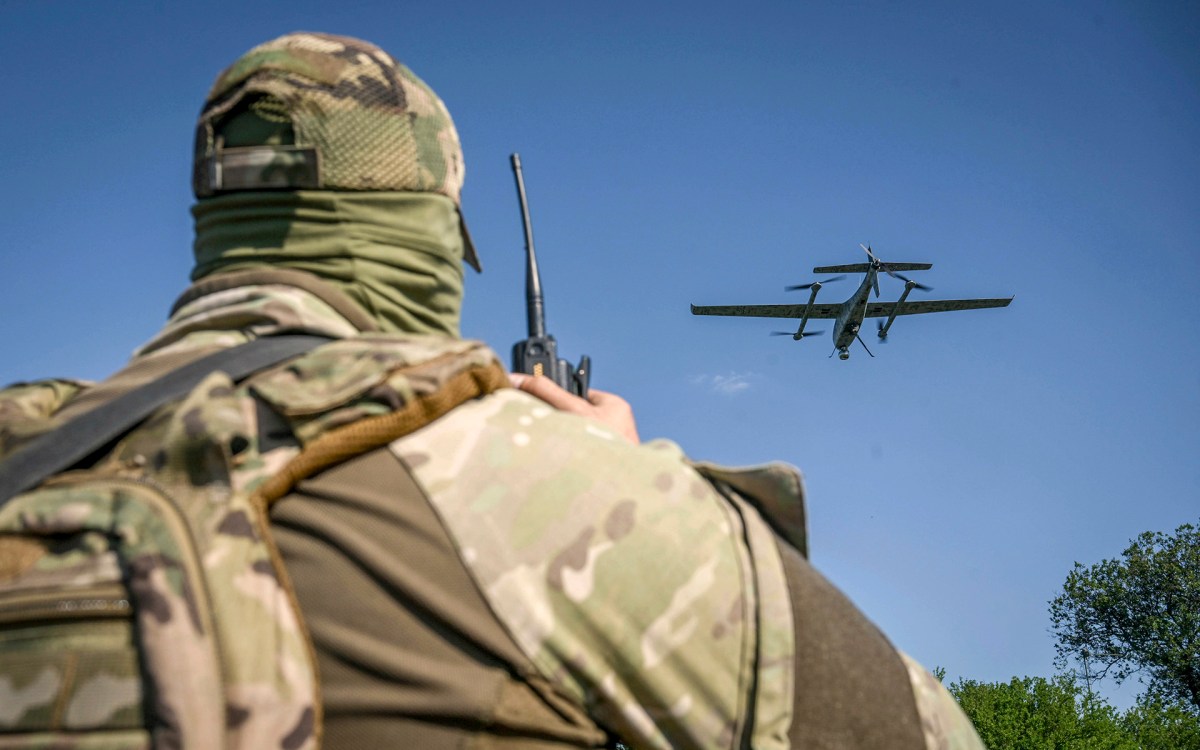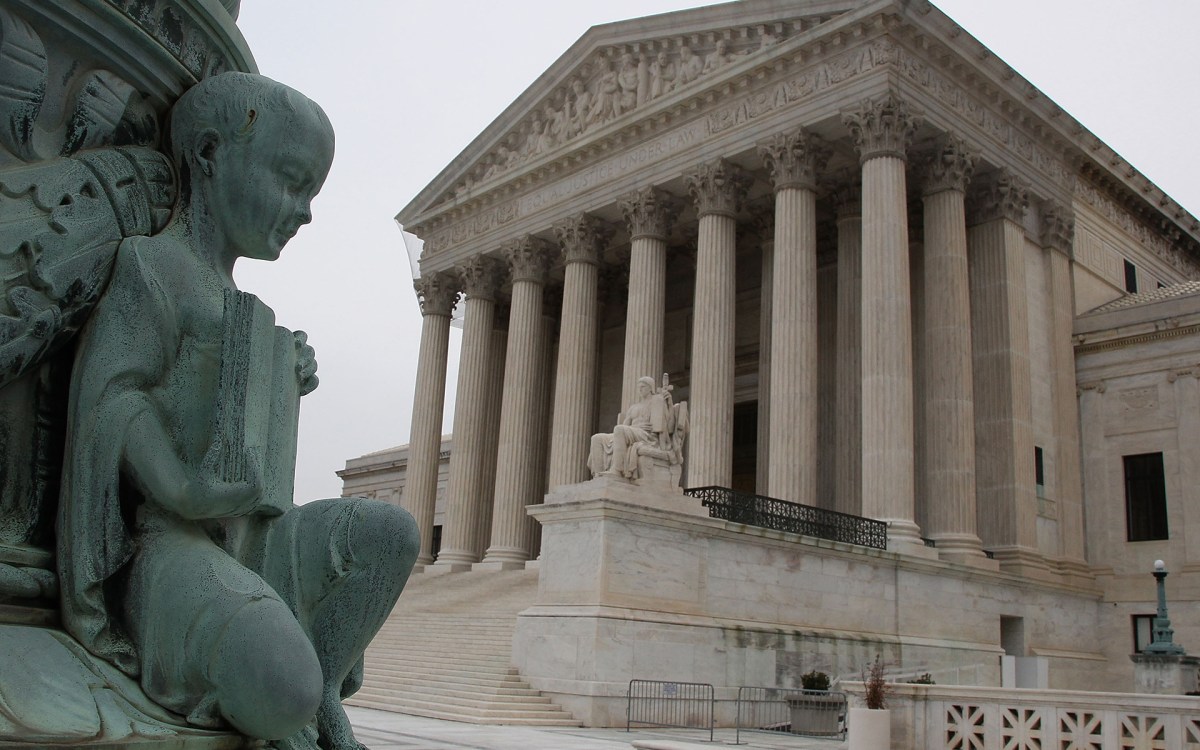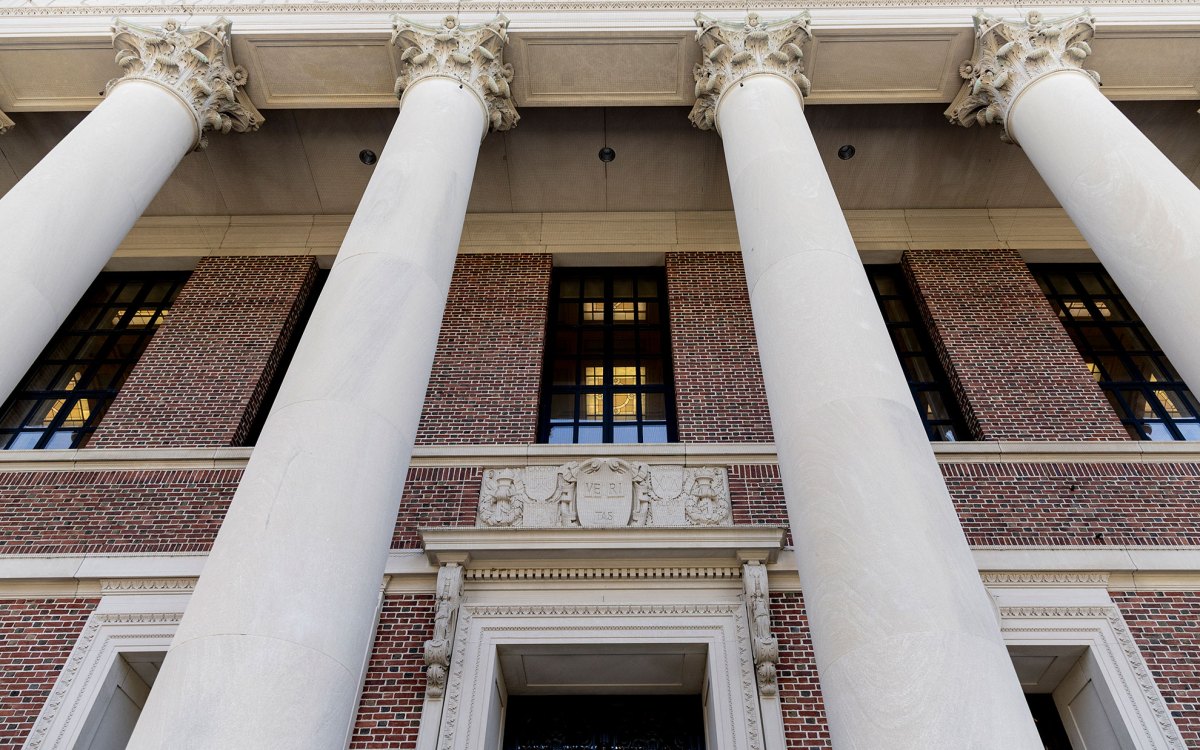Nation & World
-

As reading scores decline, a study primed to help grinds to a halt
Partnership with Texas, Colorado researchers terminated as part of federal funding cuts targeting Harvard
-

Onion holds up mirror; society flashes big smile (with green stuff in teeth)
How some students at University of Wisconsin-Madison created satiric cultural institution
-

Brainwashing? Like ‘The Manchurian Candidate’?
More than vestige of Cold War, mind-control techniques remain with us in social media, cults, AI, elsewhere, new book argues
-

Why U.S. should be worried about Ukrainian attack on Russian warplanes
Audacious — and wildly successful — use of inexpensive drones against superior force can be used anywhere, against anyone
-

Youth gun deaths rise in states that relaxed laws
Study compares child mortality rates before and after 2010 Supreme Court ruling

-

Judge sides with Harvard on international students
Extends order blocking government’s attempt to revoke participation in Student and Exchange Visitor Program
-
Global momentum for smoke-free society
In a perspective article in the April 12 issue of The New England Journal of Medicine (NEJM), researchers from the Harvard School of Public Health (HSPH) and the Association of European Cancer Leagues describe the growing momentum for indoor smoking bans in countries across the globe. They identify Ireland’s pioneering 2004 comprehensive indoor smoking ban as a likely tipping point for fundamental change in social norms and public health worldwide.
-
Government holds seeds to its own reform
The seeds of a new, more efficient government able to nimbly handle the challenges of a new century are sprouting in the corridors of today’s slow-moving bureaucracy, according to Elaine Kamarck, a lecturer in public policy at the John F. Kennedy School of Government.
-
Thompson, Huckabee, Gingrich play waiting game
While a handful of presidential front-runners dominate the headlines and airwaves, less prominent hopefuls for the 2008 Republican presidential nomination are playing a waiting game, staying alive and watching for an opportunity like an early primary victory or a stumble by a front-running candidate.
-
Notorious U.S. Supreme Court decision is revisited
Dred Scott. You don’t have to be a lawyer or historian to have that name conjure up feelings of horror and injustice.
-
Defending the Second Amendment
Like a courtroom version of “High Noon,” legal guns are squaring off this year in a confrontation over the Second Amendment. And whoever wins, the battle will touch off a longtime culture war that rivals Roe v. Wade, said National Rifle Association (NRA) President Sandra Froman in an April 5 visit to Harvard.
-
Casts of monuments preserve fading treasures
The carved stone monolith tells the story of Yax Pasaj Chan Yopaat, the 16th and last ruler of the Maya city of Copan, one of the most important sites in Maya history.
-
Africans is U.S. practice range of religions
In Nigeria, where Jacob Olupona was born, there are more Anglicans than there are in England. There is also a growing Pentecostal movement as well as a large Roman Catholic presence. In 2005 when the College of Cardinals met in Rome to choose a new pope, one of the leading contenders was a Nigerian, Cardinal Francis Arinze.
-
Forum panelists dissect ‘America’s leadership deficit’
How to address “America’s leadership deficit” was the focus of discussion Wednesday night (March 21) at the John F. Kennedy Jr. Forum. Describing the deficit as a “canyon, not a gap,” David Gergen, director of the Kennedy School’s Center for Public Leadership (CPL), argued that the challenges facing the country are growing more complex and intractable at a time when its political leaders seem paralyzed and inert.
-
Wal-Mart says ‘waste not’
Andrew Ruben’s business card is tiny: 2 11/16 inches by 1 5/16 inches, or about half the normal size. It’s also made of 100 percent post-consumer recycled paper.
-
Stem cells, through a religious lens
Representatives of three of the world’s major religions tangled over the beginnings of human life, the disposal of surplus embryos from in vitro fertilization clinics, and the conduct of embryonic stem cell research Wednesday (March 14) at Harvard Divinity School. Panelists at the event, representing Christianity, Judaism, and Islam, each briefly presented their faith’s teachings about the beginnings of human life and then embarked on a lively discussion about embryonic stem cell research.
-
Legal, ethical limits to bioengineering debated
It is a truism that “politics makes strange bedfellows,” but late Tuesday afternoon (March 20), in the Ames Courtroom of Harvard Law School’s (HLS) Austin Hall, bioethics made two sets of philosophical bedfellows as strange as any Washington has seen.
-
Former child soldier gives stirring talk
Call him Ishmael. But don’t call him part of a “lost generation.” It’s a phrase that “I absolutely detest,” Ishmael Beah, a former child soldier in the civil war in Sierra Leone, told his audience at Harvard’s Kennedy School of Government March 14 at an event co-sponsored by the Carr Center for Human Rights Policy.
-
French PM: Cooperation is the key
French Prime Minister Dominique de Villepin said the world now stands at a major crossroads, but that acting together the United States and Europe could lead the way in solving economic imbalances, ethnic and religious tensions, and the threat to the planet’s natural resources.
-
Strategists tangle at KSG
Top campaign strategists for Democratic presidential hopefuls Hillary Clinton and Barack Obama brought the early intensity of the 2008 presidential race to Harvard Monday night (March 19), scrabbling for position on a key campaign issue: the Iraq War.
-
The achievement gap, a look into causes
Paul Tough’s prescription for making children better students sounds like a license to have fun: Read to them, sing, play, emphasize encouragement over criticism, and converse a lot. Research shows a correlation between how many words a child hears in the first three years of life and brain development, he said. The more words, the smarter the child.
-
Bringing hard science to economics
Guido W. Imbens, now in his first year as a professor of economics at Harvard, was still in high school in the Netherlands when he decided to study economics. For a bright, energetic boy who had always excelled at mathematics, there was nothing dismal about the so-called “dismal science.” At Erasmus University in Rotterdam, Imbens studied econometrics, an academically rigorous combination of mathematical economics and statistics. The tools of econometrics are used to test economic theories using data, and to measure economic variables that are important for public policy.
-
Can science, religion coexist in peace?
Almost 14 billion years after the big bang, and 3.5 billion years since the first bacteria appeared on Earth, humans occupy just one branch of the tree of life. We share an evolutionary limb with other eukaryotes, creatures whose membrane-bound cells carry genetic material. Our biological neighbors developed over time just as we did, by the evolutionary forces of mutation and natural selection. They include plants, fungi, and slime molds.
-
A message of hope…from Newark
Newark, New Jersey, Mayor Cory Booker brought his message of hope and revitalization to the John F. Kennedy School of Government Monday (March 12), describing his own painful odyssey to the mayor’s office and his plans to take Newark from its blighted past to a promising future.
-
Journalism less appreciated, still essential, says NPR’s Daniel Schorr
The public has a much more jaundiced opinion about journalists than the almost heroic image they had during the Watergate era, but society needs the press to do its job just the same, National Public Radio analyst Daniel Schorr said Tuesday (March 13). “What is clear is that the press can no longer rely on public support in doing its job, but we still have to do the job,” Schorr said. “At crucial points in our history, when rights were threatened, the press was there to defend them.”
-
HGSE sponsors alumni of color conference
In a crowded banquet hall at the Cambridge Center Marriott, William Demmert Jr. Ed.D.’73 — a Tlingit who grew up in southeast Alaska — finished up a detailed lecture on Native American languages, culture, and early childhood education. And as soon as the talk ended, the 72-year-old writer and researcher was on the crowded dance floor, celebrating the last moments of a two-day (March 3 and 4) Alumni of Color Conference (AOCC), sponsored by the Harvard Graduate School of Education (HGSE).
-
HBS sponsors program for NFL pros
Is there life after pro football? The Harvard Business School (HBS) thinks so. For the third year, it’s sponsoring an executive education program for young athletes from the National Football League. In separate three-day modules, one in February and another in April, experts help the players conserve and invest the dollars they earn on the gridiron.
-
Three Republican campaign strategists say the battle’s just begun
Iraq, Mormonism, and health care topped the agenda Monday night (March 5) in a 2008 presidential campaign preview featuring top aides to three Republican hopefuls in the John F. Kennedy Jr. Forum. Campaign strategists for former Massachusetts Gov. Mitt Romney, U.S. Sen. John McCain, and former New York Mayor Rudolph Giuliani said that the Iraq War will continue to dominate the national political stage through the 2008 race.
-
Schulz: U.S. should take stand on torture
“The ancient Greeks would have been ashamed of us.” That was the assessment of Amnesty International USA’s former executive director William Schulz of the U.S. military’s abuses of prisoners at Iraq’s Abu Ghraib prison in 2004. Schulz said that Greeks and Romans routinely tortured slaves as a way to establish the truth of a situation and that torture was used so widely that they would have been surprised that just two-thirds of the world’s nations today practice torture. Still, he said, the abuses at Abu Ghraib were perpetrated not to find truth, but to humiliate the inmates there.
-
Young scholars show findings at HGSE Student Research Conference
In a basement classroom in Larsen Hall on Friday (Feb. 23), there was everything young learners need: chalkboards, a screen, bright lights, sturdy chairs – and good teachers. In this case, four good teachers – all of them Ed.M. students at the Harvard Graduate School of Education (HGSE). The four were among 230 young scholars from universities across North America at HGSE’s daylong Student Research Conference. The annual event – in its 12th year, and the only one of its kind in the country – provides a way for first-time education researchers to mingle with their peers, practice presentation skills, and get a sense of emerging scholarship.
-
Rethinking Islam from Pakistan to Texas
Two Harvard professors are spearheading a new initiative aimed at defeating “a clash of ignorances,” a clash, they affirm, that perpetuates misunderstanding, prejudice, and fear between Muslim and Western societies.
-
Speakers at Ed School say it takes a community to educate a child
By 12th grade, black students in the United States are four years behind their white counterparts in reading and math scores, according to national statistics that also show Hispanic students falling behind at a similar rate. Yet by the year 2050, the number of blacks and Hispanics in the United States will jump from 26 percent of the population to 38 percent – while whites slip from 68 percent to 49 percent.
-
Student KSG, HBS veterans honored
Student veterans of the wars in Iraq and Afghanistan shared hard-won lessons of leadership Tuesday evening (Feb. 20), providing a glimpse of the self-sacrifice, courage under fire, and devotion to comrades needed to lead U.S. troops into battle.
-
Economics in the apple heartland
A Harvard doctoral student has traveled to the wild apple’s home in the mountains of Central Asia to lend a hand to an international nonprofit working with local apple farmers to improve how they grow, harvest, and sell their crops. Plamen Nikolov, a first-year Ph.D. student in health economics, has designed an assessment survey and is leading data collection teams as they interview local households in two small villages on Kyrgyzstan’s Issyk-Kul Lake.
-
Democrats need unified message
In 1967, Charles E. Schumer, a middle-class teenager from Brooklyn, N.Y., arrived at Harvard College with two goals in mind: to play freshman basketball and to study organic chemistry. At the basketball tryout, the would-be power forward – now New York’s senior senator – never got on court, after admitting to the coach that his dribbling was poor. As for chemistry – that was quickly submerged by a sudden new interest: politics. When Schumer discovered the excitement of getting out the vote (back then, for presidential hopeful Eugene McCarthy), he decided on a social studies concentration, followed by three years at Harvard Law School.
-
Power sees U.S. foreign policy on steep downhill slide
On Aug. 19, 2003, the first suicide bomb to hit Iraq went off with a roar at the Canal Hotel in Baghdad, where the United Nations had been encamped for a dozen years. Among the dead was a Brazilian diplomat, Sérgio Vieira de Mello, the UN high commissioner for Human Rights.


